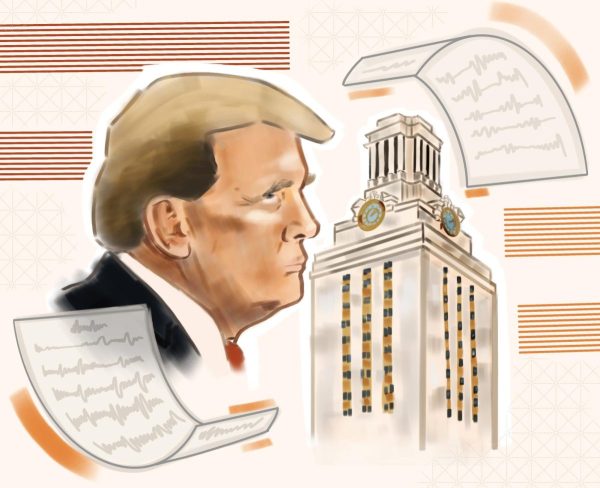President Trump sent a letter to nine colleges, including UT, on Oct. 1, inviting them to sign a “compact for excellence in higher education.” The compact would offer preferential federal funding to universities in exchange for fulfilling a slew of requests, including freezing tuition for five years and limiting speech that antagonizes conservative values. On Oct. 14, he extended the invitation to all American universities. Trump said the compact will eliminate “anti-American ideology” from universities and usher the United States into a “golden age of academic excellence.”
The compact’s goals clearly attempt to limit discussion on topics that do not align with conservative values. If staff and students fail to alter course discussions accordingly, they are at risk of ambiguous, institutionally defined punishments.

While Kevin Eltife, UT System Board of Regents Chair, said in a statement to the Texas Tribune that the system was “honored” to receive the letter, both faculty and staff have expressed concern. The Daily Texan received two open letters, one from an anonymous group of students and another from the UT chapter of the Association of American University Professors, or AAUP, calling on the Board of Regents to reject the compact.
The compact asks universities to compromise their First Amendment rights for financial compensation. UT has an obligation to its students and faculty to reject this offer, which undermines academic freedom and politicizes higher education.
“Academic freedom is fundamental to both teaching and research to consider multiple, including controversial, points of view, work at the forefront of our fields and help students understand cutting-edge ideas,” said Pauline Strong, past president of the AAUP chapter at UT.
While the compact claims to protect civil discourse, its vague language does the opposite. By restricting how students engage with diverse perspectives and how faculty disseminate their full breadth of expertise, higher education loses its very purpose: to challenge, question and expand understanding.
“Speech that offends, criticizes or belittles views is not violence and that conflation between words and violence really undermines free speech and efforts to combat actual, real threats,” said Tyler Coward, lead counsel for government affairs at the Foundation for Individual Rights and Expression.
Political pressure from state governments is nothing new for public colleges, especially in Texas, where the governor directly appoints members to the Board of Regents. This compact implements similar political pressure on a federal level. The close tie between UT and our state government could expand nationally as the compact builds a deeper relationship between universities and the federal government.
“This is crucial to faculty having freedom to make choices in their teaching, their scholarship and the dissemination of ideas,” said Erwin Chemerinsky, dean of UC Berkley Law, in an email. “This is the federal government trying to exercise unprecedented control over universities and impose a conservative political ideology on them. No presidential administration — liberal or conservative — ever has attempted to do this.”
Universities are being asked not just to accommodate, but to champion specific partisan values. For example, the compact demands universities to “transform or abolish institutional units” that “punish, belittle and spark violence against conservative ideas,” but it does not offer similar protections for ideas on other parts of the political spectrum, making it ideologically biased and violating the principle of content neutrality.
“Treating conservative ideas differently from liberal ones clearly violates the First Amendment,” Chemerinsky said. “There is a First Amendment right to belittle or criticize any idea.”
Moreover, signing the compact would jeopardize UT’s national prestige in academia. By limiting our faculty, students, curriculum and the scope of our research, we would miss critical opportunities for our students to evolve with contemporary issues.
“It lowers our moral prestige if we’re willing to give in — to sacrifice — the mission of education,” said Max Hubbard, political science freshman at Dartmouth, one of the other nine universities originally offered the compact. “Blindly submitting to this agreement and allowing continual incursions on what we’re allowed to study defies (critical) thinking.”
Brown, MIT, the University of Southern California and the University of Pennsylvania have rejected the compact. If we stray from the precedent of esteemed universities by accepting the compact’s requests, we will divide UT from other prestigious institutions.
Despite drawbacks to accepting these changes, UT would get privileged federal funding, a scarce resource for other public universities. However, UT is part of the University of Texas System, which ranks No. 3 in the United States for largest university endowment for the 2021 Fiscal Year and No. 1 in public university endowments. Therefore, excess federal funding would be unnecessary at the expense of constraining our academic freedom.
In recent years, UT has already implemented similar legislation, including campus neutrality, international student limitations, mandated standardized testing and frozen tuition funding, making the transition easier if we were to comply.
However, convenience is not worth sacrificing academic freedom. Allowing a political entity to control education by bribing administration is reprehensible enough to warrant a complete rejection of the compact, despite some aspects already applying. This openness to government overreach could lead to the complete partisan control of education, bordering on indoctrination.
UT must preserve the free speech rights of its students and faculty by rejecting this compact and opposing its political overreach into higher education.
The Editorial Board is composed of associate editors Tenley Jackson, Tiffany Lam, Tanya Narwekar, Belle Xu and editor-in-chief Ava Saunders.